Innovations
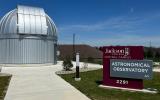
When I was young, I used to look up at the night sky and dream. I lived in Atlanta, a location filled with light pollution, so it was rare that I saw more than a few weak pinpoints of light scattered around the moon. Still, I pondered. Where did the stars come from? Did everyone see the same sky? How did the moon change shape?
Since the dawn of humanity, people just like me have looked up to the sky and wondered. Cultures across the globe have developed mythologies about the cosmos, from stories of the creation of the sun and moon to depictions of constellations. Egyptians built the pyramids...
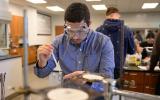
Incoming first-year students at Moraine Valley Community College who are interested in pursuing a degree in science, technology, engineering, and mathematics (STEM) have an opportunity to participate in the Greer Scholars Program, which seeks to diversify STEM careers by funding and supporting students who are underrepresented in these fields.
The Greer Foundation, which champions organizations committed to helping people improve their lives, chose Moraine Valley as the first Chicago-area community college grantee to support a cohort of students as Greer Scholars. The foundation has been...
Tags:

Chandler-Gilbert Community College’s (CGCC) Title V and Enrollment Services teams offered a career exploration curriculum for ICAN youth in summer 2024. ICAN is a free, local program that provides K-12 students in Phoenix, Arizona’s East Valley with programs for educational development.
The relationship between CGCC and ICAN began in fall 2023 when the college was invited to participate in a parent information event hosted by a local school district. During this event, parents raised numerous questions about attending college, including affordability, accessibility, and admissions criteria....
Tags:

Transfer students represent approximately 35 percent of Delta College’s student population (Delta College, n.d.). According to the college’s Institutional Research department (Kevin Hobart, August 14, 2024, personal communication), from 2014 to 2019, 2,796 Delta College students completed an associate’s degree program; 1,851 of those students transferred to a four-year institution and 1,357 completed a bachelor’s degree at their transfer institution.
As part of our efforts to strengthen transfer student success and Delta’s work with postsecondary partners, one of the college’s strategic...

Noncredit workforce education has long been an important function of community colleges. These programs typically prepare students for industry-sponsored certifications, licensures, and/or college-bestowed certificates. They have traditionally been siloed away from credit programs, and, thus, do not have to match credit hour requirements and semester schedules. Yet, in recent years, the landscape of noncredit workforce education—in terms of funding availability, program offerings, and its stature and location within colleges—has shifted dramatically (Van Noy & Hughes, 2022).
Changes to...
Tags:
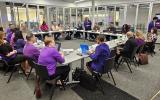
Transform_ED is a year-long Austin Community College District (ACC) research initiative and plan to anticipate and address future changes in higher education. The purpose of the research is to “analyze how external factors may impact future programmatic growth and student success at ACC to inform strategic positioning and decision-making" (Austin Community College District, n.d., Mission). The program brings together representatives from ACC’s Instruction Division, Student Affairs Division, and Teaching & Learning Excellence Division (TLED) to:
Anticipate changes in higher education and...
Tags:

Predicting the future may be a fool’s errand, but as technology evolves and societal changes occur, it is necessary for higher education leaders to consider the next phase of curriculum offerings. For the purposes of this article, the next phase will be viewed through the lens of new courses that institutions may offer as soon as 2030, if not before. A common phrase touted by college leaders and administrators for several years now is, “We are preparing students for jobs that do not yet exist.” Thankfully, there are thinktanks, advisory boards, datasets, and other tools offering predictive...
Tags:

The Ohio Department of Mental Health and Addiction Services (OMHAS) found a 353 percent increase in demand for behavioral health treatment between 2013 and 2019 (Hernandez & Lampl, 2021). Additionally, 2.4 million Ohioans live in communities that lack adequate behavioral health professionals (Ohio Department of Mental Health and Addition Services, 2023). In response to this crisis, a collaboration was formed between OMHAS and the Ohio Departments of Higher Education and Medicaid. The mission of the resulting Ohio Wellness Workforce Great Minds Fellowship is to increase the number of...
Tags:
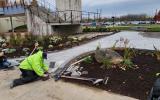
Community colleges are complicated environments impacted by precarious funding models, population shifts, burgeoning enrollments of students with nonacademic barriers to success, and more. An institutional climate can easily become volatile, uncertain, complex, and ambiguous (VUCA). In 1985, Warren Bennis and Burt Nanus’s Leaders: Strategies for Taking Charge, “emphasized the need for leaders to be adaptable, comfortable with uncertainty and ambiguity, and capable of navigating complex environments” (VUCA-WORLD, n.d., para. 3). In 1987, the U.S. military coined the term VUCA (Wright, 2023),...

In November 2021, 16 unemployed or underemployed individuals began their journey toward bettering their lives and those of their families by becoming the first cohort to participate in Santa Fe College’s (SF) new Achieve, Conquer, Believe and Excel (ACB Excel) program. ACB Excel’s mission is to empower members of the SF community who want to break the cycle of poverty, but need the financial and emotional support to do so. The concept for this program stemmed from conversations that the college’s president, Dr. Paul Broadie II, had with community leaders regarding local economic needs and...

Literature has pinpointed metrics such as credits earned and course success as important measures to best determine academic momentum for community college students (Attewell, Heil, & Reisel, 2012; Jenkins & Bailey, 2017). In fall 2020, Anne Arundel Community College’s (AACC) average course success rate was 72 percent. However, success rates at the section level often varied widely for the same course. Equity gaps existed among student groups with different demographic characteristics and based on course and section designs, such as modality and section length. To address the issue,...
Tags:

Congratulations to the 2023-2024 Innovation of the Year Award winners from 28 participating League member colleges! The League initiated the Innovation of the Year Award over 35 years ago to recognize local community college programs and initiatives that reflect the spirit of innovation and experimentation on which our organization was founded. The award provides an opportunity for colleges to showcase their innovative efforts; celebrate the dedicated educators, staff, and administrators who are responsible for this exceptional work; and promote a culture of innovation at their institutions....
Tags:
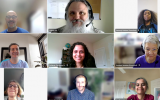
Valuing faculty and staff development as an essential component to enhancing student success, Community College of Baltimore County (CCBC) has developed a twofold approach to supporting pedagogical inquiry and learning. First, the college founded an academic journal, Teaching and Learning Excellence through Scholarship (TALES), as a mechanism to encourage faculty engagement in the scholarship of teaching and learning (SoTL). Second, CCBC established a journal club for faculty to foster a culture of curiosity and lifelong learning in pedagogy. Both of these initiatives are low-cost and high-...
Tags:

Foothill-De Anza Community College District: A Creative Approach to Increasing Access to Internships
In 2019, Foothill College Workforce Development nurtured an idea: What if we could remove one of the biggest barriers students face when entering the workforce with a low-stakes opportunity to gain experience and an internship? Students want to work, but industry professionals want to hire those who already have experience. The flip side of this scenario is that companies won’t hire those without experience and students can’t gain experience if no one will hire them. Our goal became providing students with work experience and an opportunity to explore career opportunities that they wouldn't...
Tags:

Dallas College, originally Dallas County Community College District (DCCCD), opened in 1965 and evolved into seven independent colleges positioned to meet the rapidly growing needs of the now second most populous county in the U.S. In 2020, DCCCD consolidated its individual colleges into a one-college system, with each campus location embracing the opportunities and challenges that manifest in a thriving metropolitan area.
At most higher education institutions, technology enables students to interact with a system in real time, 24/7, throughout the year. However, Hanover Research (2024)...
Tags:

The global response to generative AI (GenAI) has been varied and dynamic. There is rapid adoption in some sectors, cautious exploration in others, and a growing push for regulation. Businesses and educational institutions worldwide are leveraging GenAI to innovate and enhance productivity, from automating routine tasks to generating new content and insights. However, this enthusiasm is tempered by concerns over privacy, security, intellectual property, and the ethical implications of AI-generated content. Governments and regulatory bodies are beginning to respond, with the goal of...
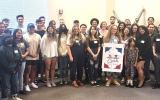
Student access and success are foundational to the community college mission. The learning paradigm proposed by Barr and Tagg (1995) initiated the student success movement, which paved the way for the completion agenda in the 2000s. However, only approximately 26 percent of community college students transfer to a four-year institution (Sansing-Helton et al., 2021). The situation is even bleaker when we evaluate the STEM fields. According to the Community College Research Center (2022), low-income community college students are less likely to transfer to a STEM field, and only 14 percent of...
Tags:

Jackson College has been committed to providing excellent education and support to its students for over 95 years. In today's fast-paced world, college students' requirements and needs are evolving. To address these needs, Jackson College has initiated a pilot program called Harriet's Hub, which serves as a one-stop student resource center.
The name hearkens back to the college’s heritage, remembering a former faculty member, Harriet Myer, who helped college students by establishing a student assistance fund. With two rooms of dedicated space in the college’s library, the hub provides...
Tags:
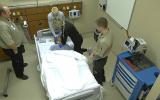
Critical thinking and clinical judgement of the nursing student is essential to the preparation of a competent novice nurse. Opportunities for students to practice making high-stakes decisions independently can be limited in the live clinical setting, for obvious safety reasons. Variations among local clinical placements may further limit the ability for entire cohorts to experience equitable patient cases. In addition, multiple nursing schools are competing for a limited number of clinical sites, straining programs’ abilities to meet clinical contact hour requirements. High-quality...

In 2022, Humber College launched the Bhutan Education and Skills Training (BEST) project, a five-year, $4.8 million (CND) initiative funded through the Government of Canada to support the reformation of the technical and vocational education and training (TVET) system in Bhutan’s technical training institutions. The project unites Humber College, Bhutan’s Ministry of Education and Skills Development, 10 national TVET institutions across Bhutan, the private sector, and local civil society organizations. The project is focused on building institutional capacity to support students who are often...










